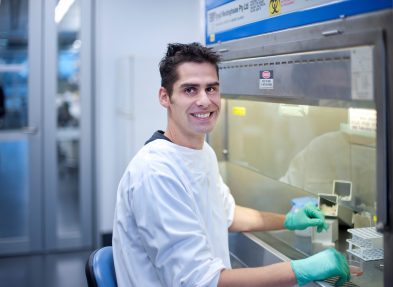Assoc. Prof Daniel Gray: Deep profiling of ALL and myeloma for targeted therapies

Chronic Lymphocytic Leukaemia (CLL) is one of the most common types of leukaemia in Australia, with over 1,300 new diagnoses each year. A disease afflicting the aged, this chronic cancer imposes a large and growing health burden on Australians. New therapies that target essential pathways in CLL, such as BCR signalling (e.g. the BTK inhibitor, Ibrutinib) or cell survival (e.g. the BCL-2 inhibitor, Venetoclax) are having an impact, yet ab initio and acquired resistance to these drugs remain major challenges. Neither drug is curative on its own. There is a need to better understand how targeted therapies can be used in combination and how their efficacy is influenced by cancer heterogeneity, so they can be directed to those patients most likely to benefit.
Most current approaches to understanding cancer and how cancers evade treatment do not resolve the molecular changes that cause resistance, which can occur at the level of individual cells. This project will use a new technology, called mass cytometry CyTOF, to study how blood cancers develop resistance to therapy and identify relevant disease pathways at the single-cell level for a better understanding of the impact of combination targeted therapy on blood cancer cell populations.
This innovative approach allows the analysis of millions of individual cancer cells from a single drop of blood in unprecedented depth. By analysing samples obtained from patients before, during and after therapy, Asc. Prof. Gray’s laboratory has already begun to identify the various ways that different blood cancers resist treatment to drive reoccurrence. With this project, they will extend this analysis to acute lymphoblastic leukaemia and multiple myeloma; conditions that impose a massive health burden on Australians. This research could lead to the design of better treatments and outcomes for these patients.
This project is kindly supported by the estate of Davina Sickerdick.
Last updated on January 30th, 2023
Developed by the Leukaemia Foundation in consultation with people living with a blood cancer, Leukaemia Foundation support staff, haematology nursing staff and/or Australian clinical haematologists. This content is provided for information purposes only and we urge you to always seek advice from a registered health care professional for diagnosis, treatment and answers to your medical questions, including the suitability of a particular therapy, service, product or treatment in your circumstances. The Leukaemia Foundation shall not bear any liability for any person relying on the materials contained on this website.